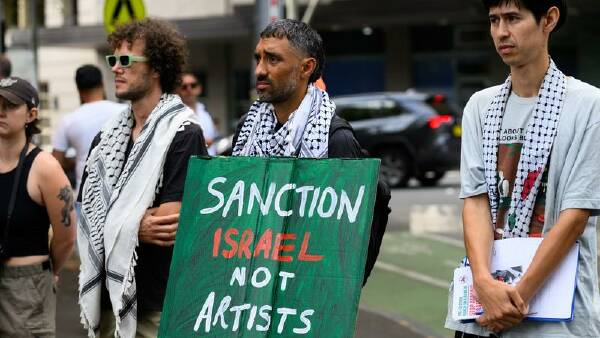
A recent report aimed at combating anti-Semitism in Australia has sparked significant controversy, with critics labeling its recommendations as an overreach. The report, authored by Australia’s anti-Semitism envoy, Jillian Segal, suggests that funding for arts bodies and events could be revoked if they do not adequately address hate speech. This proposal is part of a broader federal effort to respond to a troubling rise in discrimination against Jewish Australians.
The federal government is currently reviewing these recommendations as it grapples with increasing incidents of anti-Semitism. Writer and activist Omar Sakr condemned the report, claiming it would further silence pro-Palestinian voices. He described the proposed measures as “extraordinary overreach,” arguing that they unfairly target artists who support the Palestinian cause. Sakr, whose workshop agreements with the State Library of Victoria were recently canceled due to his political views, stated, “It’s beyond clear that the end goal of this strategy is a kind of cultural apartheid.”
In her report, released on October 12, 2023, Segal also recommended the deportation of individuals involved in anti-Semitic acts and the cancellation of their visas. Prime Minister Anthony Albanese acknowledged that the government is already implementing such measures, referencing the recent decision to block controversial US rapper Kanye West from entering Australia due to his inflammatory remarks.
Critics have raised concerns regarding Segal’s recommendation to adopt the International Holocaust Remembrance Alliance definition of anti-Semitism. Some, including the definition’s original author, Kenneth Stern, argue that it conflates legitimate criticism of Israel with anti-Semitism. Max Kaiser, executive officer of the Jewish Council of Australia, described the report as a “blueprint for silencing dissent,” claiming it promotes increased surveillance and censorship.
Segal responded to these criticisms, asserting that the definition permits criticism of Israel, highlighting that many Israelis themselves voice dissenting views against their government’s policies. She noted that the Jewish Council of Australia represents only a small segment of the Jewish community and does not reflect the broader perspectives within it.
Several Jewish organizations have expressed support for the report’s recommendations, which include integrating Holocaust education into school curricula and strengthening laws against hate speech. They also advocate for the withdrawal of funding from institutions that fail to adequately confront anti-Semitism.
The report has also drawn attention to the portrayal of pro-Palestinian protests. Ashlyn Horton, president of the National Union of Students, emphasized the importance of distinguishing between genuine anti-Semitism and criticism of Israel, calling the conflation of the two a significant concern.
As the political discourse surrounding this issue unfolds, prominent journalist Jan Fran highlighted the humanitarian crisis in Gaza, noting that nearly 200 Palestinians have been killed in recent escalations. She warned that if Segal’s recommendations restrict the media’s ability to report on such matters, it could lead to serious implications for free speech in Australia.
According to Segal’s report, the number of reported threats and violent incidents against Jewish Australians tripled between October 2023 and September 2024. In a parallel effort, Aftab Malik, Australia’s envoy to combat Islamophobia, is expected to deliver a comprehensive set of recommendations to the Prime Minister soon.
The government’s response to the report and the ensuing debate reflects the complex dynamics of free speech, cultural identity, and the ongoing Israeli-Palestinian conflict, raising questions about the balance between protecting communities and fostering open dialogue.







